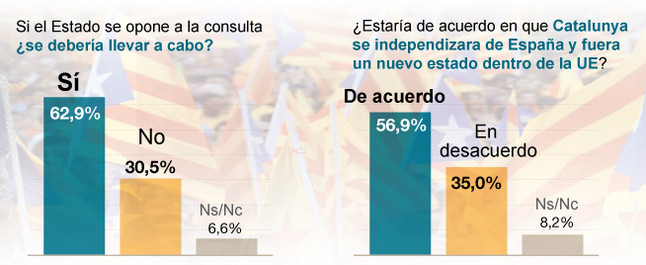I'm sure many of you will have noticed from the blog list on the right that the Catalan Parliament this week approved a Declaration of Sovereignty as one of the steps leading towards a referendum on independence in 2014. The full text of the Declaration is here, and this is a short report from Euronews.
In the clip, Alícia Sánchez-Camacho, the leader of the Spanish Partido Popular in the Catalan parliament, claimed that "most of the Catalonian people don't want independence and don't want this division". And even the report in the Guardian claimed that opinion is "evenly divided" over Catalan independence. But neither of these claims is true.
This is a graphic showing the result of a GESOP poll in El Periódico on Sunday:

If the [Spanish] State opposes the referendum, should it be carried out anyway?
Yes ... 62.9%
No ... 30.5%
Don't know/won't say ... 6.6%Do you agree that Catalunya should be independent from Spain and become a new state within the EU?
Agree ... 56.9%
Disagree ... 35.0%
Don't know/won't say ... 8.2%
The percentage in favour of independence is almost exactly the same as it was in the Baròmetre d’Opinió Política of November last year, which was 57.0%. Details here. As I said then, Catalan independence looks like a cast-iron certainty.
The EU is an organization that isn't usually inclined to make decisions until it has to. It hasn't particularly addressed the issue of Scotland's place in the EU simply because the opinion polls show that there is a considerable degree of uncertainty about whether Scotland will vote for independence. Nor is it likely to particularly address the UK's place in the EU either, because there's an even greater degree of uncertainty about the Tories winning the next UK election with a mandate to renegotiate the UK's terms of membership and hold a referendum.
But the political will of the Catalan Parliament and the degree of public support shown in the opinion polls should be enough, surely, to get the EU to start answering questions about how it will accommodate Catalunya as a new member state in its own right.
![]()
Update - 19:27, 26 January 2013
Another poll by CEO was published on 7 January, although the fieldwork was conducted in late September and early October 2012. This was before the post-election agreement between CiU and ERC for the referendum to be held some time in 2014.
Vostè està totalment a favor, més aviat a favor, més aviat en contra o totalment en contra que Catalunya sigui un nou estat d'Europa en els propers anys?
Are you totally in favour, rather in favour, rather against or totally against Catalunya becoming a new state in Europe in the coming years?
Totally in favour ... 49.9%
Rather in favour ... 19.4%
Rather against ... 10.6%
Totally against ... 13.5%
Don't know ... 4.5%
Won't say ... 2.1%Overall in favour ... 69.3%
Overall against ... 24.1%



